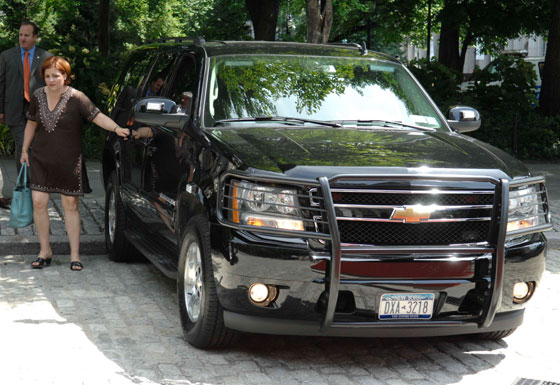Christine Quinn is not known as a politician who shies away from shying away, but it might be time to ditch her public indifference toward NYC DOT's street safety and public space program.

Monday evening, the Times reported on a Times Square Alliance study that, Great Recession notwithstanding, shows booming growth since 2007. Currently, the district "contributes one-tenth of all of the jobs in the city and $1 of every $9 of economic activity," to the tune of $110 billion per annum -- 11 percent of the city's economic output.
Rosemary Scanlon, an economist who has lived in the city since 1969, said the numbers seemed plausible because the area was filled with tourists. Ms. Scanlon, the interim dean of the Schack Institute of Real Estate of New York University two blocks from Times Square, said that earlier studies had shown that people who came to the city for Broadway shows and museums stayed two nights or more, on average, and spent significant sums while in the city.
She said the effects of the transformative power of redevelopment may be most visible west of Times Square, where Larry Silverstein and other developers have built luxury apartment towers in places where no market for them previously existed. (The study gives Times Square credit for spawning all of that construction.)
But the most convincing evidence Ms. Scanlon offered was the newfound respect paid by New Yorkers. “I’m hearing people saying, I know this sounds nuts, but I had some out-of-town visitors and I took them to Times Square,” she said. “I find myself saying, I want to walk you down there and I want you to see this.”
Though the Times doesn't mention it, "this" refers at least in part to the public plaza installed in Times Square in 2009, a project that transformed the "crossroads of the world" from a gridlocked nightmare to a place people want to be. Judging from the fawning Quinn profile in Elle magazine, however, the back of the "Chrismobile" may not offer the best perspective.
She supported Mike’s move to extend term limits, which paved the way for his third term as mayor, as well as his unsuccessful attempt to institute “congestion pricing” to make motorists pay more to enter parts of Manhattan. But she blocked his pet plan to build a sports stadium over the West Side rail yards. As for his controversial “nanny initiatives,” she agreed with the smoking ban in city parks but is agnostic on the no-salt thing and the proliferation of bike lanes and the weird tables he set up in the middle of Broadway, transforming the street into an ad hoc (some might say ugly) plaza.
So business is booming thanks to the plazas, the new bikeways are preventing needless deaths and injuries, and New Yorkers have embraced the policies. When 64 percent of Democratic primary voters favor bike lanes, why should a frontrunner in the mayoral race feel "agnostic"?
It's probably too much to ask of city journos to own up to the manufactured skepticism or apologize for the unbridled nastiness with which they greeted Bloomberg’s signature public space initiative, or for a fashion magazine to grasp the difference between regulating salt and keeping people from being run over. But the smart money is on the pol who recognizes a good thing when she sees it.





